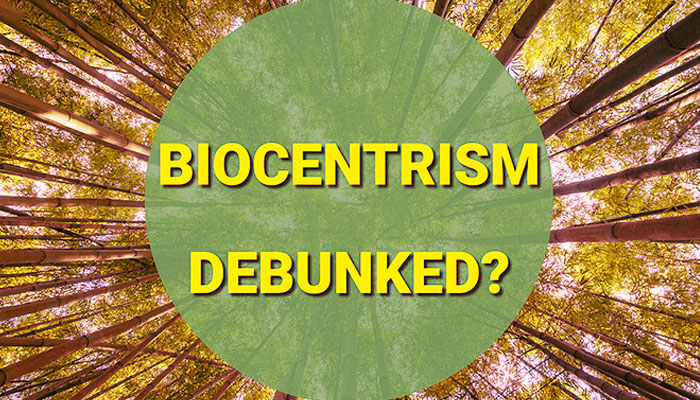Biocentrism Debunked: Unveiling the Truth behind the Controversial Theory

Biocentrism Debunked is a philosophical concept that places the value of living organisms at the center of existence, suggesting that all living beings possess inherent worth and should be respected and protected. While this theory has gained popularity among some environmentalists and ethicists, it has also attracted its fair share of controversy. In this article, we will delve into the world of Biocentrism Debunked, exploring its origins, the criticisms it has faced, and the scientific evidence that challenges its validity. By the end, we hope to shed light on the truth behind this controversial theory.
Introduction to Biocentrism Debunked
Biocentrism, as a concept, seeks to redefine our relationship with the natural world. It proposes that all living organisms, from humans to animals to plants, have intrinsic value and should be regarded as worthy of moral consideration. This theory stands in contrast to anthropocentrism, which places humans at the center of the universe and prioritizes their needs and desires above all else.
Advocates of biocentrism argue that by acknowledging the inherent worth of all living beings, we can foster a more compassionate and sustainable approach to the environment. They believe that by recognizing the interconnectedness of all life forms, we can better understand our place in the world and act as responsible stewards of the planet.
Overview of the Controversy Surrounding Biocentrism
Despite its noble intentions, Biocentrism Debunked has faced significant controversy and critique. One of the main criticisms stems from the challenge of determining the inherent worth of different organisms. Critics argue that assigning equal value to all living beings fails to acknowledge the complexity and diversity of life forms. They contend that a one-size-fits-all approach cannot adequately address the complex ethical questions that arise when considering the value of different organisms.
Another area of contention is the practicality of implementing biocentric principles in our daily lives. Opponents argue that while the theory may sound appealing in theory, it is often challenging to apply in practice. For example, if all organisms possess equal value, how do we prioritize our actions when faced with conflicting needs or limited resources? Critics argue that biocentrism fails to provide clear guidance on how to navigate these ethical dilemmas.
Criticisms and Debunking of Biocentrism
While biocentrism has its share of supporters, it has also faced robust criticism from various scientific and philosophical perspectives. One of the primary arguments against biocentrism is rooted in evolutionary biology. Critics assert that natural selection and the process of evolution favor traits and behaviors that enhance an organism’s survival and reproductive success. Therefore, they argue that the focus on the intrinsic value of all organisms is incompatible with the fundamental principles of evolution.
Furthermore, critics challenge the assumption that all organisms have equal moral worth. They argue that the capacity for consciousness, self-awareness, and the ability to experience pleasure or suffering should be considered when determining ethical value. According to this viewpoint, humans, with their higher cognitive abilities and capacity for moral reasoning, should be accorded a different moral status than other organisms.
Scientific Evidence Against Biocentrism Debunked
Beyond philosophical and ethical criticisms, there is also a growing body of scientific evidence that challenges the foundations of biocentrism. One area of contention lies in the concept of consciousness and subjective experience. Biocentrism posits that consciousness is a fundamental aspect of the universe and that it exists even beyond the realm of human perception. However, current scientific understanding suggests that consciousness is a product of complex neural processes and is intricately linked to specific brain structures. This perspective casts doubt on the notion of a universal consciousness that permeates all living beings.
Additionally, the field of ecology provides insights that counter the biocentric view. Ecological research has shown that ecosystems are dynamic and complex, with intricate webs of interdependencies between different species. The survival and well-being of an ecosystem often rely on the delicate balance between predator and prey, competition for resources, and symbiotic relationships. Critics argue that a strict adherence to biocentric principles may disrupt these delicate ecological interactions and potentially harm the very organisms it seeks to protect.
Alternative Theories to Biocentrism
While Biocentrism Debunked may have its flaws, it has undoubtedly sparked important discussions about our relationship with the natural world. In response to the limitations of biocentrism, alternative theories have emerged that seek to provide a more nuanced understanding of our ethical responsibilities towards the environment.
One such theory is ecocentrism, which places the entire ecosystem at the center of moral consideration. Ecocentrism recognizes the intrinsic value of both living and non-living components of an ecosystem and emphasizes the importance of maintaining the integrity and functioning of the ecosystem as a whole. By focusing on the ecosystem rather than individual organisms, ecocentrism seeks to address some of the criticisms leveled against biocentrism.
The Implications of Debunking Biocentrism
Debunking biocentrism does not mean dismissing the importance of environmental conservation or ethical considerations towards living beings. On the contrary, by critically examining the flaws and limitations of biocentrism, we can better refine our approach to environmental ethics. Recognizing the value of scientific evidence and incorporating a holistic understanding of ecosystems can help us develop more effective strategies for preserving the environment and promoting sustainable practices.
Debunking Misconceptions about Biocentrism
In the discussions surrounding biocentrism, several misconceptions have emerged that need to be addressed. One common misconception is that biocentrism promotes the idea of complete equality among all organisms. In reality, proponents of biocentrism argue for equal moral consideration but acknowledge the inherent differences between species and the need for context-specific ethical decision-making.
Another misconception is that biocentrism encourages a hands-off approach to nature. While biocentrism does emphasize the value of non-interference with natural systems, it does not preclude human intervention when necessary for the well-being of ecosystems or individual organisms. Biocentrism advocates for a responsible and informed approach to human interactions with the environment.
Experts’ Opinions on Biocentrism
The controversy surrounding biocentrism has elicited a range of opinions from experts in various fields. Some philosophers and environmentalists champion biocentrism as a necessary shift in our ethical framework, highlighting its potential to foster a more sustainable and compassionate world. However, others caution against the oversimplification of complex ethical questions and argue for a more nuanced approach that considers both the intrinsic value of living beings and the broader ecological context.
Conclusion: The Truth behind Biocentrism
Biocentrism Debunked, despite its noble intentions, has faced significant criticism and scientific challenges. While it has sparked important discussions about our relationship with the natural world, it is essential to critically examine its limitations and explore alternative theories that offer a more comprehensive understanding of our ethical responsibilities towards the environment. By embracing a holistic approach that incorporates scientific evidence and acknowledges the complexity of ecosystems, we can develop more effective strategies for environmental conservation and ethical decision-making.
🌍 CTA: Join the conversation and share your thoughts on Biocentrism Debunked. Leave a comment below and let us know your perspective. Together, we can explore the complexities of environmental ethics and work towards a more sustainable future. 🌿



